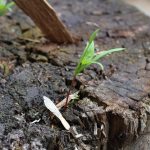Lately, memories from my childhood have been surfacing, like fragments of a forgotten dream. One late afternoon stands out vividly. I had gone to buy Baba Dudu from a Hausa man’s kiosk, drawn there not just for the goods but for the intoxicating blend of Hausa perfume and heavy incense that filled the air around the kiosk. As I passed by, I noticed a man in front of the house beside our rented apartment. It was a beautiful bungalow, often empty, with its owners living abroad. Only a single road separated their house from ours, leading down to a popular secondary school in the neighbourhood.
The man sat slumped on the floor by the entrance. He looked weary and worn out, his clothes tattered and his face etched with lines of exhaustion, as if he had been toiling under the scorching sun all day. Our eyes met, and in that fleeting moment, I saw an overwhelming sense of helplessness in his gaze. At the time, I didn’t fully understand what I saw, but now, looking back, it’s clear to me. He was a soul in desperate need. And now I understand why I wanted to ease his weariness with an encouraging smile and a little wave, but fear held me back. Stories of child kidnappings for rituals were rampant, and my parents had sternly warned me not to speak or shine my teeth at strangers. So, I walked away.
Read – Monday Evening, 1950 – A Creative Non-Fiction by Carla Chait – South Africa
Evening came, and my dad returned from the university where he worked. He brought the almond fruits he had promised to pluck for me. I savoured each bite, blissfully unaware of the storm gathering outside. Then, the rain came, pouring relentlessly, washing away the day’s warmth. I didn’t think about the man again, assuming he had found shelter or left for his destination.
But he hadn’t, because the next morning, someone found him dead, still in front of the house next door. My heart sank as my father and some neighbours went to investigate. They called the police, but after some digging, they couldn’t trace his family. He died homeless, cold, hungry, and alone.
I often think about his last moments and how he must have prayed for help that never came. Now, I realize how small acts of kindness can mean the world to someone in need. I wonder if a simple smile or a kind word from me could have made a difference. I sincerely wonder. As a child, I was taught to fear the unknown, but as an adult, I see the tragedy in allowing fear to override compassion for the unknown.
Read – A Silent Battle Called Grief – A Creative Non-Fiction by Catherine Kuria – Kenya
I carry the memory of that man with me, a reminder of the fragility of human life and the acute impact of our actions or inactions. I hope the other side favoured him and that he found the peace that eluded him in this life. And I hope, in some small way, to honour his memory by choosing compassion over fear and by seeing the humanity in every stranger’s eye who is ever in desperate need.
—

Ayogu Chidimma is an avid reader, a budding physics/electronics technologist, and a writer focused on connecting with readers emotionally. Through heartfelt storytelling and poetry, she aims to show that, while she may not know the full extent of someone’s pain, she can relate and offer comfort through words. Over the past two years, she has achieved a personal milestone by reading 100 books, and is on track to complete 150 this year (2024). Some of her works were recognised when she won the Ronovella Writing Contest (May 2022 edition), and she regularly contributes as a guest writer to a blog where she shares book reviews and recommendations. Every piece she writes is crafted to resonate with readers on a deeply emotional level.







